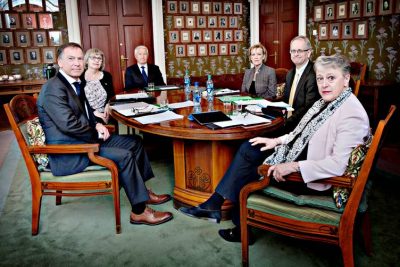The Norwegian committee that selects Nobel Peace Prize winners every year has once again found itself caught in conflict. Critics, now including nearly 20 professors at the universities of Oslo and Bergen, contend that Norwegian politicians should no longer be appointed to seats on committee, just as more such appointments loom.

News broke over the weekend that 76-year-old Inger-Marie Ytterhorn, a former politician for the Progress Party, wants to retain her seat on the Norwegian Nobel Committee for another six years. She was first appointed to the committee in 2000 and told newspaper Aftenposten this week that she hopes her party will re-appoint her because “I meet lots of exciting people” and “it’s still exciting work.”
Ytterhorn once again faces a challenge, however, from one of her own party colleagues, former Progress Party leader Carl I Hagen. He was bitterly disappointed when Ytterhorn was re-appointed and he was passed over in 2012, and he’s made it clear he’s still keen on taking over the Progress Party’s seat. Hagen, age 73, had no comment on Ytterhorn’s stated desire of re-appointment once again. The two reportedly are not on speaking terms.
Ulf Leirstein, who leads the Progress Party’s election committee, told Aftenposten that it was still “wide open who we land upon.” Leirstein claimed the party was free to recommend anyone among a number of candidates and may choose someone else entirely.
Call for changing Parliament’s “routines”
That might please long-time Nobel Committee critic Fredrik Heffermehl, an Oslo attorney who runs the watchdog organization Nobel Peace Prize Watch and doesn’t want either Ytterhorn or Hagen to sit on the committee. He’s been joined by the 19 Norwegian professors who sent a letter this week to the president of the Norwegian Parliament, asking it to “change its routines for the election of members to the Nobel Committee.” They want the parties able to make appointments to choose experts on peace or disarmament, not career politicians who’ve been rewarded with a seat on the committee.
“The Parliament’s assignment (in electing Norwegian Nobel Committee members) isn’t about Norwegian politics and party politics, not about what representatives think about peace policy themselves,” they wrote in what Oslo newspaper Dagsavisen called a “protest letter.” Rather, Heffermehl and the professors argue Nobel wanted “a professional committee,” like those set up to award the other Nobel prizes in literature, medicine or chemistry, for example.
Heffermehl went so far as to suggest on Wednesday that the Swedish Nobel Foundation, which he claims is ultimately responsible for the Peace Prize under Swedish law, may not be legally able to pay out the prize proceeds if the Norwegian Nobel Committee fails to carry out the intentions of Alfred Nobel. Those intentions include, according to Heffermehl, selection of “a committee dedicated to Nobel’s revolutionary idea on how to protect humankind from future wars.”
Three of five members subject to replacement
Under the terms of prize benefactor Alfred Nobel’s will, the Nobel Peace Prize is to be awarded by a committee “of five persons, to be elected by the Norwegian Storting (Parliament).” It’s been widely written over the years that Nobel wanted the Norwegian Nobel Committee to reflect the relative strengths of the political parties in Parliament. Heffermehl claims that in 1948, when the Labour Party had an absolute majority in Parliament, it was the Parliament itself that decided the committee should reflect the make-up of Stortinget, which now has a slimmer non-socialist majority following last month’s election.
That means the Progress Party will retain its control over a seat. The Conservative Party has been expected to retain its two seats, while Labour also has two. Both Labour and the Conservatives reached beyond the ranks of former politicians in their latest appointments, with Labour choosing prominent Oslo attorney Berit Reiss-Andersen and the Conservatives tapping philosopher Henrik Syse, who’s tipped to take over as leader of the committee.
The election last month may, however, usher in more changes to the committee beyond who fills the seat currently held by Ytterhorn. Newspaper Aftenposten reported Thursday that the Center Party’s strong election result last month may give it one of the Conservatives’ two seats on the committee. Even though Labour is widely viewed as having lost the election, it may get to keep its two seats because it remains the largest in Parliament with 27.4 percent of the vote. The Conservatives slipped to 25 percent (from 26.8 percent in 2013) with Progress next at 15.2 percent. Then comes the Center Party, with 10.3 percent of the vote, nearly double what it won in 2013. Since Center now sides with Labour on the socialist side of Norwegian politics, it may be argued that Labour should give up one of its seats to Center, not the Conservatives.
More political appointments tipped
The Center Party is regardless reported to only be considering two of its own former top politicians, Anne Enger or Åslaug Haga, if Center gets a seat. That would clearly fuel more objections from the professors and Heffermehl. The Conservatives, who’d been expected to name a new member for the same seat to replace the late Conservative Party leader and former government minister Kaci Kullmann Five, also reportedly were considering one of their former top politicians as well, former foreign minister and party leader Jan Petersen.
One of Labour’s two seats (the one currently held by committee leader Reiss-Andersen) is up for re-appointment a well, but she’s expected to be re-appointed if she wants another six-year term. Even Heffermehl has praised her work, not least for her reasoning behind this year’s Nobel Peace Prize to the International Committee to Abolish Nuclear Weapons (ICAN). Heffermehl also supported the choice, for the first time in many years.
Only former prime minister Thorbjørn Jagland, appointed by Labour, and Syse, appointed by the Conservatives, are assured of continuing on the committee, because their terms run until 2020.
newsinenglish.no/Nina Berglund

